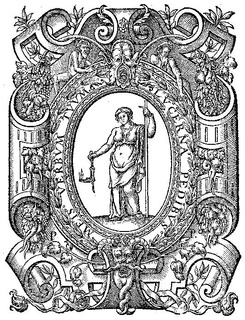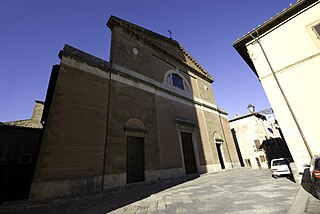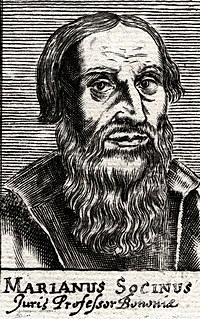
Socinianism is a system of Christian doctrine named for Fausto Sozzini, which was developed among the Polish Brethren in the Minor Reformed Church of Poland during the 16th and 17th centuries and embraced by the Unitarian Church of Transylvania during the same period. It is most famous for its nontrinitarian Christology but contains a number of other unorthodox beliefs as well.

The University of Siena in Siena, Tuscany is one of the oldest and first publicly funded universities in Italy. Originally called Studium Senese, the institution was founded in 1240. It had around 20,000 students in 2006, nearly half of Siena's total population of around 54,000. Today, the University of Siena is best known for its Schools of Law, Medicine, and Economics and Management.
Gaetano Milanesi (1813-1895) was an Italian scholar and writer on the history of art.

Fausto Paolo Sozzini, also known as Faustus Socinus or Faust Socyn (Polish), was an Italian theologian and founder of the school of Christian thought known as Socinianism and the main theologian of the Minor Reformed Church of Poland.
The Racovian Catechism is a nontrinitarian statement of faith from the 16th century. The title Racovian comes from the publishers, the Polish Brethren, who had founded a sizeable town in Raków, Kielce County, where the Racovian Academy and printing press was founded by Jakub Sienieński in 1602.

The Jesuati (Jesuates) were a religious order founded by Giovanni Colombini of Siena in 1360. The order was initially called Clerici apostolici Sancti Hieronymi because of a special veneration for St. Jerome and the apostolic life the founders led. The order was abolished by Pope Clement IX on 6 December 1668.
Francesco Angiolieri, known as Cecco Angiolieri was an Italian poet.

Pietro Perna was an Italian printer, the leading printer of Late Renaissance Basel, the Erasmian crossroads between Italian Renaissance humanism and the Protestant Reformation. His books promoted the Italian heretical thinkers at the origins of Socinianism and the theory of Tolerance. He was a major publisher of Protestant historians like Flacius Illyricus and David Chytraeus and promoted the ars historica treatises of the period, notably the 18 authores de historia in Artis Historicae Penus (1579).

Filippo Decio or Decius was an Italian jurist whose services were courted by European universities and rulers. He was an influential representative of the pre-Humanist scholastic ius commune tradition.

Gentile Gentili da Foligno was an Italian professor and doctor of medicine, trained at Padua and the University of Bologna, and teaching probably first at Bologna, then at the University of Perugia, Siena (1322-24), where his annual stipend was 60 gold florins; he was called to Padua (1325-35) by Ubertino I da Carrara, Lord of Padua, then returned to Perugia for the remainder of his career. He was among the first European physicians to perform a dissection on a human being (1341), a practice long that had been taboo in Roman times. Gentile wrote several widely copied and read texts and commentaries, notably his massive commentary covering all five books of the Canon of Medicine by the 11th-century Persian polymath Avicenna, the comprehensive encyclopedia that, in Latin translation, was fundamental to medieval medicine. Long after his death, Gentile da Foligno was remembered in the Nuremberg Chronicle (1493) as Subtilissimus rimator verborum Avicenne, "that most subtle investigator of Avicenna's teachings"

Colle di Val d'Elsa Cathedral is a Roman Catholic cathedral in Colle di Val d'Elsa, Tuscany, Italy. Anciently a pieve of the Holy Saviour, it is now dedicated to Saints Albert and Martial. Formerly the episcopal seat of the Diocese of Colle di Val d'Elsa from its creation in 1592, it is now a co-cathedral of the Archdiocese of Siena-Colle di Val d'Elsa-Montalcino.
Celso Sozzini (1517–1570) was an Italian freethinker, brother of Alessandro, Lelio, Cornelio, Dario, and Camillo.
Giuliano Briganti was an Italian art historian.
Sergio Focardi was an Italian physicist and professor emeritus at the University of Bologna. He led the Department of Bologna of the (Italian) National Institute for Nuclear Physics and the Faculty of Mathematical, Physical and Natural Sciences at the University of Bologna.
Alberto Bolognetti (1538–1585) was an Italian law professor, bishop, diplomat, and cardinal. He was appointed by Pope Gregory XIII as a papal nuncio to Florence, Venice, and the Polish–Lithuanian Commonwealth. In that last appointment, he persuaded King Stephen Báthory to adopt the Gregorian calendar. He was promoted to cardinal priest, but died before he could return to Rome for the ceremonies.

Stefano Rodotà was an Italian jurist and politician.

Lelio Luttazzi was an Italian composer, musician, actor, singer, conductor, writer, and television and radio presenter.

Sozzini, Sozini, Socini or Socin is an Italian noble family originally from Siena in Tuscany, where the family were noted as bankers and merchants, jurists and humanist scholars. The family has been described as "the most famous legal dynasty of the Renaissance."
Camillo Sozzini was an Italian humanist and "heretic". He was the brother of Alessandro Sozzini, Lelio Sozzini, Cornelio Sozzini, and Dario Sozzini.












